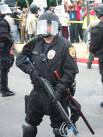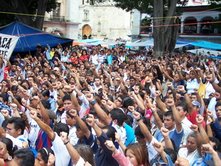
Central Asian Leadership for a Nuclear-free Korean Peninsula
With a political sky darkened by the nuclear weapon test of North Korea and the growing tensions over the nuclear program of Iran, a ray of sunlight comes from Central Asia.

With a political sky darkened by the nuclear weapon test of North Korea and the growing tensions over the nuclear program of Iran, a ray of sunlight comes from Central Asia.

In a stealth maneuver, President Bush has signed into law a provision which, according to Senator Patrick Leahy (D-Vermont), will actually encourage the President to declare federal martial law (1). It does so by revising the Insurrection Act, a set of laws that limits the President's ability to deploy troops within the United States. The Insurrection Act (10 U.S.C.331 -335) has historically, along with the Posse Comitatus Act (18 U.S.C.1385), helped to enforce strict prohibitions on military involvement in domestic law enforcement. With one cloaked swipe of his pen, Bush is seeking to undo those prohibitions.

The US administration’s double standards in dealing with the intensifyingnuclear crisis in
Considering the US-North Korea protracted standoff, one can only imagine howfoolishly disposed Iraqi dictator Saddam Hussein must now feel that hedidn’t pursue a more determined programme of weapons of mass destruction.Even if one would accept

I had an epiphany about ten years ago when I was invited to a White House picnic for the press corps.


Jose Santiago sits in front of the radio station's guarded door with a box of bread rolls in his lap. To his left, soda crates filled with Molotov cocktails line the wall. To his right two women with a club stretched between them block the door. A 62 year-old elementary school principal in Oaxaca City, Santiago was supposed to retire this year, but when state police brutally repressed a teachers' strike on June 14, sparking an unprecedented civil uprising from all sectors of society, he thought, "I'd rather jump in."
Copyright Toward Freedom 2019